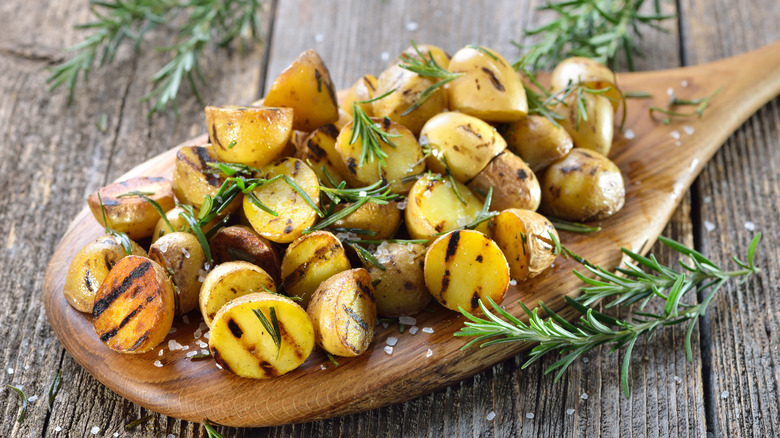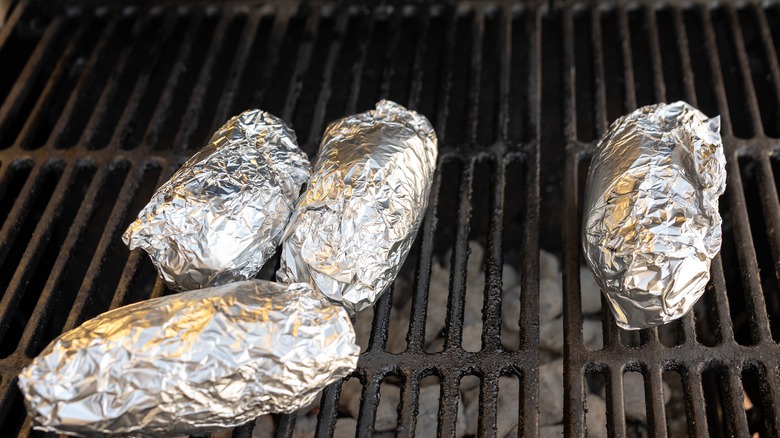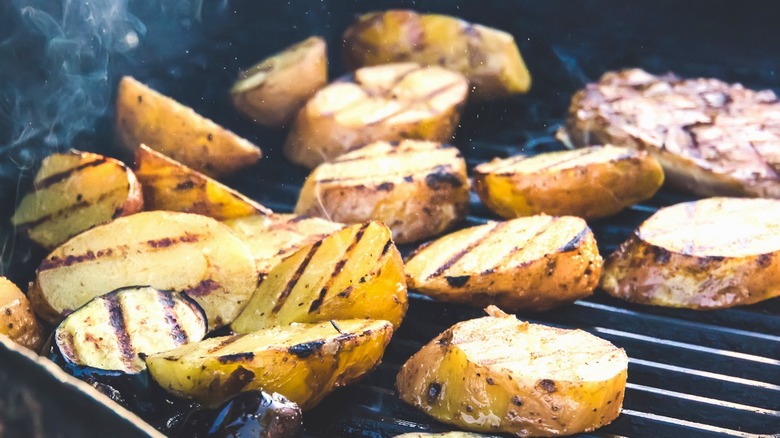Foil Or No Foil: How Should You Be Grilling Potatoes?
Grilled potatoes make one of the world's finest sides. Filling and flavorful, they're the perfect accompaniment for anything from grilled steak to pork to veggie burgers and beyond. However, the best way to prepare potatoes for the grill is not always clear-cut. One school of thought insists on wrapping the spuds (whether whole, sliced, quartered, or halved) in aluminum foil before introducing them to the grill. The other philosophy eschews any wrapping in favor of putting the taters down bare over the heat.
Proponents of either technique will swear their own way is best, but both methods have their merits and drawbacks. Plus, it's really your own personal preference for texture, flavor, and convenience that determines whether or not you should swaddle your potatoes in foil for grilling. After all, one person's perfect spud is another person's worthless dud. If you want a softer potato, for instance, the foil can help you achieve that. If you prefer a smoky flavor, you're better off letting your potato soak up the heat and smoke without that aluminum barrier. There are other factors as well that impact whether foil or no-foil is the way for you.
For softer potatoes and convenient cooking, wrap them in foil
Foil-wrapped potatoes have a notably different texture than their unwrapped counterparts. Since these potatoes are trapped with their moisture during grilling, they're essentially steaming, resulting in a softer texture to both interior and skins. If you enjoy that steamy quality — with a fork that goes in like butter — you might favor the foil. Foil is also for you if you dread getting your grill messier than needed. Foil-wrapped potatoes are unlikely to stick to grill grates (though to be fair, one of the best beginner grilling tips is to oil both your grill and your potatoes to mitigate sticking if you're setting them on the grates without foil). It's also easy to add herbs and seasonings right into the foil packet to infuse your spuds with flavor.
That said, don't expect a crispy exterior when grilling potatoes in foil. Nor will you have picture-perfect grill marks and that notably smoky flavor, but you can poke holes in the foil to allow some smoke to penetrate if you wish. Finally, be careful of overcooking when using the foil method — potatoes can go from "pleasantly soft" to "mushy and soggy" quite easily. Stick a fork in your taters to check that they're not veering into mushiness.
To foil-grill potatoes, rub a sheet of foil with butter, add your seasonings, and roll up your potato. Poke holes in the foil if desired, and cook for 45 minutes to an hour.
For crispier potatoes with a smoky flavor, leave off the foil
Straight-on-the-grate potatoes reveal an entire other world of benefits and drawbacks compared to the foiled version. The first major change you'll encounter is in flavor and texture. If you prefer potatoes with a crisp, caramelized exterior and a more intense smoky flavor, this technique is for you. You'll also get those nice grill marks on your potatoes this way.
Plunking down your potatoes sans barrier means you might have to pay more attention while they're grilling to prevent them from burning or cooking unevenly. In addition, you might encounter some sticking if your grill grates aren't well-seasoned. Then there's the issue of time. If you're going with sliced potatoes, the grill time won't be so long — about 10-15 minutes in total, flipping them at the halfway point. With whole spuds, however, you're looking at anywhere between 1 hour to 75 minutes until they're done – a slightly longer cook time than whole potatoes in foil jackets.
One helpful step to minimize grill time and prevent uneven cooking is to parboil your potatoes with a splash of vinegar in salted water for 10 minutes before grilling them. This can also ensure extra flavor makes it into your taters from the salt they'll have absorbed in the pot. Once parboiled, potato wedges only need 5 minutes on the grill with a midway flip; whole potatoes need a bit longer and are done when fork-tender and charred.


